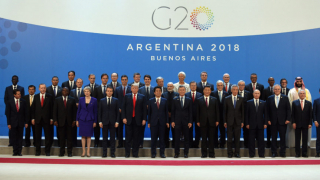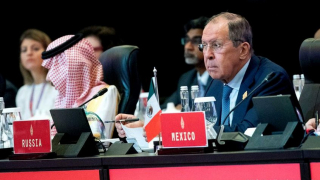Post-liberal G20: Politics chains the economy
Latest G20 summit in Hamburg once again proved that the world is in phase of critical transition. The way this event was organized, informational field around it and topics discussed during the sessions outline the most important fact of current reality: economy is marginalized while politics is once again considered the core of all global processes.
"End of history" proclaimed by neoliberal scholars at the turn of XX and XXI centuries meant that economical development and competition will be subject of interest for everyone in the world as liberalism seemed to be the only political model remaining with no alternatives to fight it. But severe crises in political and economical spheres of the West as well as rapid recovery of Russia and growing influence of emerging countries proved that history is alive and has a lot of things to say.
Non-economic summit of world' largest economies
G20 was created as a broader format by G7 members when they understood that economy of western countries does not let them to control global processes - share of emerging countries was growing faster than anyone could predict. So creating a format that would include 19 biggest economies and EU as a separate member seemed a logical move. But year by year topics on such summits where shifting more and more away from economy towards politics. Eventually in 2017 global community saw the final transition of G20 to its newest formula: global superpowers discuss politics while strongest economies listen. Not a single major news piece coming out of Hamburg was describing economic talks. Meeting of Vladimir Putin and Donald Trump definitely was a political event. Topics of their discussion touched such aspects as war in Syria, Ukrainian crisis and cyber warfare. None of these can be called economical. Also the agenda of what once was meant to be an economic summit contained such issues as war in the Middle East, fighting terrorism, migration and securing stability in the internet. Such traditionally liberal points as trade practices, job equality and women's rights were marginalized by the organizers themselves and all the participants of the summit.
Why does it happen?
Crisis of American hegemony and collapse of unipolar system has led to faster construction of multipolar system of international relations. As every pole in this structure needs some kind of inner justification of its existence, economical reasons have devalued a lot. Sphere of trade, finance and industry is incapable of creating values that could explain new paradigm both on interior and exterior levels. So all the leaders are now trying to copy the way Vladimir Putin has walked for 17 years to create new sovereign states that would be independent economically and what's even more important politically. China, India, Turkey, Iran, Brazil and many others - all these states are now on the way to their sovereignty. That is also the reason why Russia's leader was the real headliner of the summit, even though a lot of experts thought Trump would have played that role. Putin is now the only bearer of this kind of political thinking. It is obvious that in coming years Russia will be the main source of new anti-liberal ideology that must help other countries to make a step into post-liberal future.








